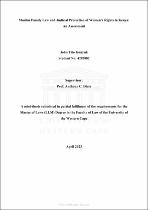Muslim family law and judicial protection of women’s rights in Kenya: an assessment
Abstract
The status of women in Muslim majority and minority states is a major question in the articulation of rights in non-Western settings. Contestations over women’s rights in these societies are thought to stem from conundrums that Muslims face when they struggle to comply with constitutional and statutory norms that reify equality and non-discrimination, while staying true to the teachings of their religious tradition, which may not necessarily reflect those norms. This study set out to explore the practice of Muslim Family Law in Kenya in order to assess whether and the extent to which the law, as it is currently adjudicated in Kenyan courts, protects the rights of women. The study examined the evolution of Muslim family law and the legal and institutional frameworks that underpin the protection of Muslim women’s rights in Kenya. The study relied on case law from the Kadhis’ court, the High Court and the Court of Appeal in the assessment of judicial protection of women’s rights. Findings reveal that women assert their family law rights in the courts by using tools within the Islamic legal tradition and taking advantage of state laws, which promote an egalitarian vision of rights. Courts are found to be proactive in allowing women’s access to their rights and redressing violations of rights in the adjudication of Muslim family law. However, the lack of clarity on jurisdictional questions and the absence of a definitive madhhab or school of law in the administration of Muslim family law are found to be drawbacks that may hamper women’s enjoyment of their rights. It is recommended that amendments of the laws be made to redress legal indeterminacy.

